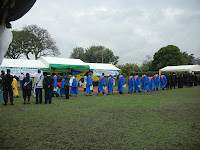 On 03 November 2012, we attended the graduation ceremony at Mount Meru University (MMU), near Arusha Tanzania. We went primarily for the seminary branch (tawi) graduates. Several who are and/or work with Maasai were finishing well and were receiving top honors for all their studies and hard work.
On 03 November 2012, we attended the graduation ceremony at Mount Meru University (MMU), near Arusha Tanzania. We went primarily for the seminary branch (tawi) graduates. Several who are and/or work with Maasai were finishing well and were receiving top honors for all their studies and hard work.Pam and I arrived early. We greeted many people who we had seen recently and not so recently, as well as the graduating tawi class.
We went to find some seats since the graduation was outside, chairs had been set under tents, and a light rain was beginning to fall.
Many seats were available so we made our selection, placed some things in our seats, and proceeded to visit with several acquaintances. After a few minutes, we were informed by ushers that our first seat selection was in the graduate seating section.
We promptly moved our things to other seats as the crowds were starting to arrive. As we sat down, several groups of Maasai, who were there to support their graduates, sat all around us. We greeted many of them and had a great time visiting with them.
 An usher came up to us and asked us if we had "formal printed invitations" as only those with these in their possession could sit in the chairs. If you did not have an invitation, you had to stand until seats became available.
An usher came up to us and asked us if we had "formal printed invitations" as only those with these in their possession could sit in the chairs. If you did not have an invitation, you had to stand until seats became available.We knew 14 of the graduates but had not received one actually printed invitation. They all invited us through phone text messages and face to face.
 So, Pam turned to the usher and said, "We are with all of them", pointing to all the Maasai who were already seated. They certainly were distinguished with their festive clothing and jewelry.
So, Pam turned to the usher and said, "We are with all of them", pointing to all the Maasai who were already seated. They certainly were distinguished with their festive clothing and jewelry."Oh, " the usher replied, "Ok, you all can stay here"
No one was going to question us with all our Maasai friends there.
No one was going to question or challenge the Maasai either.
It truly is who you know and who you are with that helps in certain situations!


















































